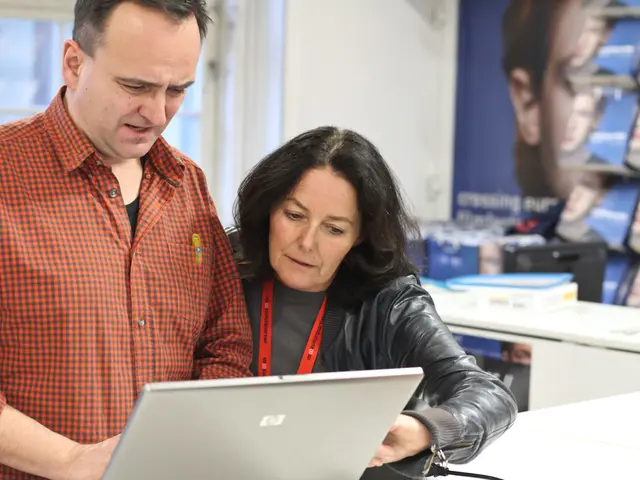Progression in Patent Legislation: Emerging Developments and Obstacles to Overcome
Patent law, a cornerstone of innovation and intellectual property protection, is currently facing significant challenges in the era of artificial intelligence (AI). As the world grapples with the prevalence of patent trolls, the need to balance innovation with competition, and the complications introduced by globalization, patent law is evolving to accommodate these changes.
The Evolution of Patentability in AI Inventions
Recent updates in patent law, such as the USPTO's guidance from August 2025, are focusing on the practical application and technical improvement of AI inventions rather than the mere presence of AI or algorithms. To be patent-eligible, claims must go beyond abstract ideas and include an "inventive concept" or technological improvement [1][3].
The USPTO applies the Supreme Court’s two-step Alice/Mayo test to AI patents: first, determining if claims are directed to a patent-ineligible concept, and second, assessing if claims contain an inventive concept that transforms the abstract idea into a patent-eligible invention by adding "significantly more" [1][3]. This approach aligns with international standards, such as Europe’s requirement for a "technical effect" beyond algorithms alone and India’s narrow patent eligibility due to software exclusions unless a technical effect is demonstrated [5].
Human Inventorship and AI
Despite the integration of AI into inventions, the concept of inventorship remains grounded in human involvement under current patent laws. AI cannot be named as an inventor because inventorship involves intentional conception and creativity, which AI lacks as a non-legal person [2].
The distinction between AI-assisted and AI-generated inventions impacts ownership and inventorship claims. To secure patent rights, businesses should involve human inventors actively in the innovation process and document human contribution clearly [2].
Adapting to the AI-Driven Future
As AI continues to accelerate and amplify innovation capabilities, the legal construct of inventorship remains reliant on human agency. Businesses must adapt strategically in how inventions incorporating AI are claimed and prosecuted [4].
Patents play a pivotal role in fostering innovation within emerging industries such as biotechnology, renewable energy, and information technology, by providing a mechanism for companies to protect their intellectual property and incentivize research and development. However, the rise of patent trolls, or non-practicing entities (NPEs), has instigated a wave of lawsuits targeting companies, particularly in technology sectors, which can be financially burdening and force many entities to settle out of court to avoid costly litigation.
Embracing the Future of Patent Law
Future strategies for patent protection will emphasize adaptability and technological integration, such as enhancing international collaboration, leveraging technology like blockchain for patent tracking and verification, and integrating AI tools in patent searching and analysis. Reforms in patent law aim to streamline patent processes and reduce litigation burdens, including addressing the issue of patent trolls and re-evaluating existing regulations in light of technological advancements, particularly AI.
The landscape of patent law is significantly shaped by various evolving trends, including globalization, technological advancements, the increasing awareness of sustainability, and the role of the internet. AI's ability to produce novel inventions raises critical questions about the patentability of such creations, particularly when assessing novelty and non-obviousness in AI-generated outputs. The integration of artificial intelligence into the realm of patent law is profoundly reshaping the landscape of intellectual property rights, raising questions about the traditional understanding of inventorship and patentability.
[1] USPTO Guidance on Patenting AI and Machine Learning Inventions [2] AI and Patent Law: Navigating the Complexities [3] Patenting AI: Balancing Innovation and Protection [4] AI and the Future of Patent Law [5] AI, Patents, and the Future of Innovation
- The USPTO's focus on the practical application and technical improvement of AI inventions in their recent updates indicates a shift towards requiring an "inventive concept" or technological improvement for patent-eligibility, to go beyond abstract ideas andpatents related to technology.
- In the context of the integration of AI into inventions, the legal construct of inventorship remains grounded in human involvement under current patent laws, with AI being unable to be named as an inventor due to the requirement for intentional conception and creativity, which AI lacks as a non-legal person.




